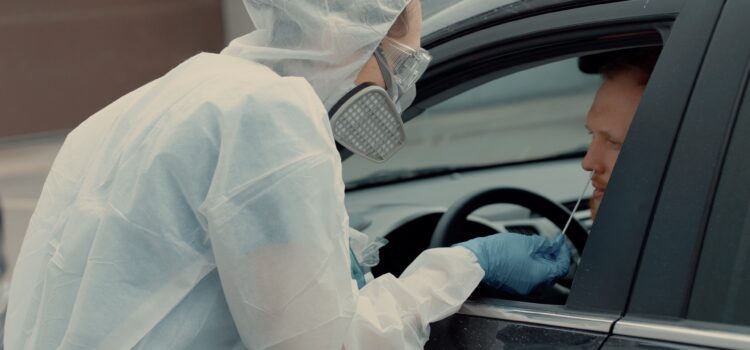
Since the COVID-19 pandemic spread across the nation, health professionals have been worried about a number of resources to fight the virus. First it was tests, then ventilators and Intensive Care Unit beds, and then nurses and now contact tracers.
Within the past two week, the Kern County Public Health Department has hired more than 20 staff members, bringing the total to more than 100 staffers, many of which contact trace on any given day, according to Michelle Corson, the department’s spokeswoman. The County is currently not hiring anymore contact tracers; however, that could change in the future, Corson said.
Kim Hernandez, Kern Public Health’s lead epidemiologist, said now that cases have begun to decrease, contact tracing has become a little more stable.
“We had a large surge earlier this month and got a lot more staff,” Hernandez said. “We’re still feeling out how many staff needs to continue on their current job duties. We’re assessing tasks where needs are.”
Hernandez said because of the unknown virus expectations, Public Health is constantly having to move staff around in order to be able to respond with contact tracing.
Contact tracers begin case investigations for people who test positive for COVID-19. They help these patients recall everyone they have had close contact with during the time they may have been infectious. The contact tracers then notify the exposed people as quickly as possible. These people are then given support to help them understand their risk, what they should do, and how to monitor symptoms.
Contacts are encouraged to stay home, monitor their health, and maintain social distance (at least 6 feet) from others until 14 days after their last exposure to the infected patient, in case they also become ill.
One contact tracer reaches out to 15 to 25 patients per day, according to Corson. The goal is to reach out to patients within 72 hours when receiving a positive lab result.
On average, for every case Public Health identifies, there are about four contacts identified, Kern Public Health Director Matt Constantine said at a July 16 press conference.
On Thursday, Kern Public Health announced 320 new COVID-19 cases. This means if each case had four contacts, contact tracers would have to reach out to about 1,280 people in three days to reach the department’s goal.
With a recent increase in COVID-19 cases, some patients are left waiting for their results for as long as two weeks, leaving for the potential of exposing others because contact tracing hasn’t begun.
Corson said there have also been some patients who got tested at a private practice, were found positive and were never contacted by public health officials for contact tracing; however, this isn’t the case for all patients. Doctors at a private practice or testing facility are mandated to notify Public Health.
“If this is done timely, then an initial letter is sent to the patients notifying them to fill out the self-report questionnaire via online,” Corson said. “This will expedite the process when Public Health staff contacts them for contact tracing investigation.”
Other communities across California have expanded beyond county employees for contact tracing and have partnered with community-based organizations to aid with the task.
Fresno County has partnering with the Fresno Economic Opportunities Commission to immediately add 300 contact tracers to help stop a surge of COVID-19 cases, reports GV Wire. Officials announced on Tuesday that $5.5 million in Fresno County CARES act funding would go toward the effort.
Fresno County Supervisors said the contract tracers “will help bridge communications gaps that may be preventing rural farm worker communities and other under-served populations from receiving the information and support needed to help contain COVID-19,” GV Wire reports.
Fresno’s contact tracing efforts include working with 17 CBOs, incluidng Fresno Building Healthy Communities, Central Valley Health Policy Institute, Fresno Interdenominational Refugee Ministries, Centro Binacional, Go Public Schools, and Cultiva La Salud. The diverse set of organizations will allow contact tracers to reach out to vulnerable communities that will be done in a “culturally and linguistically appropriate way,” said Emilia Reyes, CEO of the Fresno Economic Opportunities Commission.
The Kern County Public Health Department, in partnership with the Kern County Hispanic Chamber of Commerce, has developed a COVID-19 awareness campaign, and all the materials are in both English and Spanish.
“Specifically, we have provided awareness in Spanish through social media, flyers and infographics, billboards (several located in East Bakersfield), radio and TV PSA’s and our COVID-19 webpage includes Spanish guidance documents and dashboard,” Corson said.
Kern Public Health also provides sign language translation services during press conferences; however, other languages have not been used for the County’s COVID-19 resources.
In Oakland, a $63 million grant from Kaiser Permanente will go to Oakland-based Public Health Institute to provide targeted, community-based contact tracing in areas hit hard by the virus, says Cap Radio. The goal is to recruit contact tracers to work directly in their own communities, said Public Health Institute (PHI) President and CEO Mary Pittman.
Pitman says the key to contact tracing is, “reaching out to community-based organizations — to trusted people in the community — to explain what we were trying to do.”